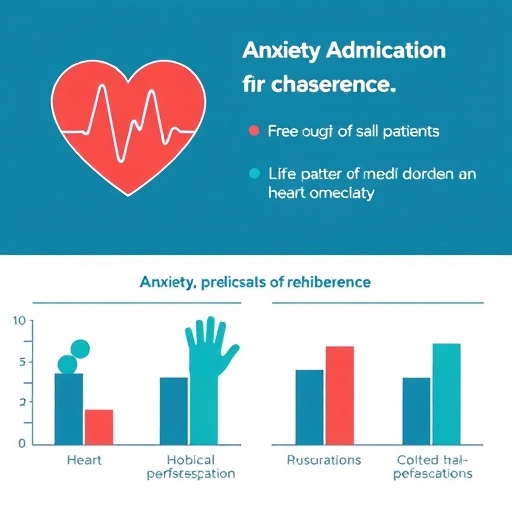In recent years, the complex interplay between mental health and physical health has become an increasingly pivotal field of study, revealing profound implications for patient outcomes. A newly published systematic review and meta-analysis in BMC Psychiatry has cast light on the vexing issue of anxiety disorders and their influence on medication adherence among individuals with cardiovascular disease (CVD). This comprehensive study synthesizes data from a vast cohort of over 72,000 patients, probing the ways anxiety undermines critical health behaviors, particularly the consistent use of prescribed cardiovascular medications.
Cardiovascular diseases remain a leading cause of mortality worldwide, demanding rigorous management strategies including strict adherence to medication regimens. However, anxiety disorders—a group of mental health conditions characterized by excessive fear, worry, and physiological symptoms—appear to present a formidable barrier. The intricate mechanisms by which anxiety disrupts medication adherence have been elusive, yet this new meta-analysis delivers robust pooled evidence highlighting the severity of the issue.
The study, conducted by Wang et al., draws from 23 observational studies, including both cross-sectional and longitudinal designs, to analyze the relationship between anxiety and medication-taking behaviors. Employing advanced statistical techniques via random-effects meta-analysis, the authors ensured that variability among studies was accounted for, providing a more generalized and reliable synthesis. The striking result demonstrates a statistically significant negative association between anxiety disorders and adherence to cardiovascular medications.
Diving deeper into the data, the researchers identified a series of clinical subgroups within the cardiovascular patient population. Individuals diagnosed with hypertension, congestive heart failure, and ischemic heart disease all exhibited diminished medication adherence when anxiety was present. For example, patients with ischemic heart disease showed the most pronounced decrease in adherence rates, emphasizing the urgent need to address anxiety in this vulnerable group.
One of the unique strengths of the study lies in its scale and methodological rigor. The sample size averaged an age of approximately 61 years, reflecting a typical cardiovascular patient demographic, and encompassed a near-even distribution of male and female participants. The inclusion of a diverse population enhances the external validity of the findings, suggesting these results may be broadly applicable across various settings and healthcare systems.
Despite the strong evidence supporting the negative role of anxiety on medication adherence, the authors caution that much of the data is drawn from cross-sectional studies, which limits the ability to infer causality definitively. Cross-sectional designs capture snapshots in time but cannot elucidate the temporal sequence between anxiety onset and declining adherence. Longitudinal studies, though fewer in number, do lend support to the premise that anxiety precedes or exacerbates medication non-compliance, but further prospective research is needed.
The underlying physiological and psychological pathways potentially explaining this association are multifaceted. Anxiety may impair cognitive functions such as memory and executive functioning, which are critical for maintaining consistent medication schedules. Moreover, heightened physiological arousal and stress responses can alter perceptions of medication efficacy or side effects, fostering avoidance behaviors. Emotional dysregulation linked to anxiety disorders might also diminish motivation for self-care, exacerbating the challenge of chronic disease management.
Clinically, these findings underscore the necessity for integrated care models whereby mental health screening and interventions are embedded into cardiovascular treatment protocols. Addressing anxiety symptoms could conceivably improve adherence rates, thereby reducing cardiovascular morbidity and mortality. Possible interventions include cognitive-behavioral therapy, mindfulness-based stress reduction, and pharmacological treatments tailored to alleviate anxiety without adverse cardiac side effects.
This review notably calls attention to the heterogeneity across included studies, which may stem from differences in anxiety assessment methods, definitions of medication adherence, and population characteristics. Such variability underscores the complexity of synthesizing behavioral and psychological data, urging development of standardized measures in future research to enhance comparability and clinical utility.
The meta-analytic evidence presented offers a compelling narrative for healthcare providers to reconsider the siloed approach to treating cardiovascular diseases. Integrating psychosocial care is not merely additive but may be fundamental to the success of traditional biomedical therapies. As anxiety disorders remain highly prevalent globally, their ripple effects on chronic illness management are likely substantial and warrant high-priority attention.
This systematic review and meta-analysis pave the way for targeted clinical trials investigating interventions that simultaneously tackle anxiety and adherence behaviors in cardiovascular patients. These efforts could revolutionize treatment paradigms, ensuring that mental health considerations are normal components of comprehensive cardiovascular care, ultimately improving quality of life and clinical outcomes.
In conclusion, the association between anxiety disorders and poor medication adherence in cardiovascular disease is both significant and clinically meaningful. While methodological limitations preclude definitive causal assertions, the amassed evidence compels medical professionals to broaden their focus beyond physiological symptoms and include mental health as a core dimension of cardiovascular disease management.
As the healthcare community continues grappling with the dual epidemics of mental disorders and chronic diseases, studies such as this provide a critical foundation for evidence-based policy and practice reform. The path forward necessitates multidisciplinary collaboration, rigorous research designs, and patient-centered interventions that together can transform outcomes for millions affected by this global health challenge.
Subject of Research: The relationship between anxiety disorders and medication adherence in patients with cardiovascular disease.
Article Title: Association between anxiety disorders and medication adherence in patients with cardiovascular disease: a systematic review and meta-analysis of observational studies.
Article References:
Wang, T., Li, Z., Wei, Y. et al. Association between anxiety disorders and medication adherence in patients with cardiovascular disease: a systematic review and meta-analysis of observational studies. BMC Psychiatry 25, 1005 (2025). https://doi.org/10.1186/s12888-025-07350-w
Image Credits: AI Generated




